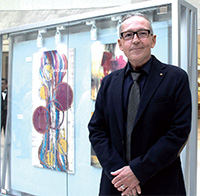BOOK OF THE WEEK with Linda Jennings. The Narrow Road To The Deep North, Richard Flanagan, ISBN 9780701189051 (Random House) BD8.500 for Gulf Weekly Book Club members
Forever after, there were for them only two sorts of men: the men who were on the line, and the rest of humanity, who were not.
The Narrow Road to the Deep North is a love story unfolding over half a century between a doctor and his uncle’s wife.
Taking its title from one of the most famous books in Japanese literature, written by the great haiku poet Basho, Flanagan’s novel has as its heart one of the most infamous episodes of Japanese history, the construction of the Thailand-Burma Death Railway in World War II.
In the despair of a Japanese POW camp on the Death Railway, surgeon Dorrigo Evans is haunted by his love affair with his uncle’s young wife two years earlier. Struggling to save the men under his command from starvation, from cholera, from beatings, he receives a letter that will change his life forever.
Hailed as a masterpiece, Richard Flanagan’s epic novel tells the unforgettable story of one man’s reckoning with the truth.
Born in Tasmania in 1961, Richard Flanagan is one of Australia’s leading novelists, having received numerous honours. His books are published in 26 countries. His father, who died the day Flanagan finished The Narrow Road to the Deep North, was a survivor of the Burma Death Railway.
* Read it now in paperback
The Search Warrant, Patrick Modiano, ISBN 9781846553615 (Random House) BD5 for Gulf Weekly Book Club members
‘Missing a young girl, Dora Bruder, 15, height 1.55m, oval-shaped face, grey-brown eyes, grey sports jacket, maroon pullover, navy blue skirt and hat, brown gym shoes.’
The author chanced upon the above notice in a December 1941 issue of Paris Soir.
The girl has vanished from the convent school which had taken her in during the Occupation. She had apparently run away on a bitterly cold night at a time of especially violent German reprisals. Moved by her fate, the author sets out to find all he can about her.
Eventually he discovers her name in a list of Jews deported to Auschwitz in September 1942 and what further fragments he is able to uncover about the Bruder family become a meditation on the immense losses of the period - people lost, stories lost, human history lost.
Modiano delivers a moving survey of a decade-long investigation that revived for him the sights, sounds and sorrowful rhythms of occupied Paris. And, in seeking to exhume Dora Bruder’s fate, he in turn faces, and must come to terms with, his own family history.
* My favourite read-of-the-week
Us David Nicholls, ISBN 9780340897003 (Hodder) BD7.900 for Gulf Weekly Book Club members
‘I was looking forward to us growing old together. Me and you, growing old and dying together.’
‘Douglas, who in their right mind would look forward to that?’
Douglas Petersen, a middle aged biochemist, lives with his wife whom he adores and a teenage son whom he also adores (but from a distance). All is perfect in Douglas’s life until his wife wakes him up in the middle of the night to tell him that she thinks she wants a fresh start.
Whilst Douglas attempts to understand his wife’s need to ‘rediscover herself’ now that their son is leaving home for college, he thought they’d be doing their rediscovering together (without teenage Albie).
So when Connie announces that she will be leaving, too, he resolves to make their last family holiday into the trip of a lifetime.
What could possibly be easier?
The hotels are booked, the tickets bought, the itinerary planned and printed so off they go on a bitter-sweet adventure during which Nicholls skilfully dissects with much humour 25 years of marriage, the difficulty of parenting, letting go and moving on.
There is much wisdom in this book and I suspect that many will sympathise, whilst either laughing or despairing, with Douglas. If you are a parent, it is easy to relate to the incidents that occur. Written with extreme skill, the story moves effortlessly from past to present but unlike many books in this style, the narrative flows as the tale unwinds; so I suspect that, like me, most readers will open the book and keep reading until the somewhat surprising end.











